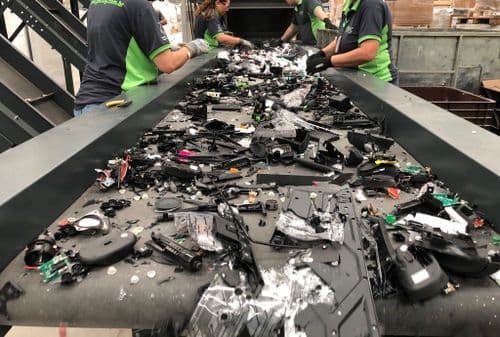
02/03/2023
Electronic waste recycling can generate 40,000 jobs in Brazil
By Silvana Guaiume, Circular Movement press office (adapted)
Electronic waste recycling produced in Brazil can generate 40,000 direct jobs and at least BRL 800 million a year, according to information obtained from data from Circular Movement and GM&C, a company that operates in the sector. Brazil is the fifth largest producer of electronic waste in the world and produces 2 million tons of this material per year, according to the most recent report released by the United Nations (UN) in 2019. According to the survey, only 3% of this waste is recycled.
Circular Movement and GM&C, specialized in reverse logistics and recycling of electrical and electronic equipment, have entered into a partnership to expand the recovery of electronic waste and promote positive impacts on the environment. The joint efforts of the two organizations will provide new ideas and projects with great potential for engagement and multiplication of circular economy concepts.
Continue reading and:
- Understand how electronics recycling can generate jobs and financial resources
- Discover circular reverse logistics solutions for this sector
Understanding the numbers
Among the largest producers of electronic waste in the world, Brazil is only surpassed by China, the United States, India and Japan. The pedagogical coordinator of the Circular Movement, Edson Grandisoli, explains that “the focus of recycling is to give a new destination and use of materials that traditionally end up in landfills and dumps, making them remain in circulation longer, one of the precepts of the circular economy,” he points out.
GM&C's institutional relations coordinator, Henrique Mendes, says that currently there is no official number on the total amount of electronics that are recycled annually in Brazil, but estimates show that only 3% of discarded electronics would be, in fact, recycled in the official and traceable manner. According to him, there are no exact figures for the financial return on recycling electronic waste in Brazil.
However Mendes signals with numbers that point to this impact. GM&C alone recycled 6,000 tons of electronics last year, an operation that generated at least 140 direct jobs and another 380 indirect jobs. Taking into account that Brazil produces 2 million tons of electronic waste per year, the recycling and reuse of all this material could generate 42 thousand direct jobs and another 110 thousand indirect jobs. “It is possible to estimate the social gain that the segment can bring to the country, becoming an important sector of the economy”, says the coordinator.
 Photo credit: GM&C
Photo credit: GM&C
Grandisoli recalls that 3% of electronic waste recycling in Brazil is equivalent to 60,000,000 kilos. According to different sources, each kilogram of this recycled material generates from R$ 0.40 to R$ 4.00, depending on the waste. “Therefore, recycling generates today in Brazil around R$ 24 to R$ 240 million. If all the trash were recycled, we could reach a figure of at least R$ 800 million to R$ 8 billion”, he calculates.
In addition to the social and economic gain, the correct recycling of electronics reduces negative impacts on the environment, since electronic waste includes materials such as plastic, iron, glass and metals. “By recovering these resources through recycling, we avoid the need to extract virgin raw materials from nature”, comments Mendes.
Another positive impact of the activity is related to the increase in the useful life of landfills. When this material is no longer sent to dumps to be landfilled, municipalities reduce expenses with this service and landfills have an extended useful life. “With these estimates, we can assess the magnitude of the gains that could be generated when we stop wasting all these resources and encourage the formal recycling chain of electronics”, says Mendes.
Electronics are equipment that have hundreds of different substances in their composition, some of them with potential danger, which can cause damage to health and the environment if handled incorrectly. That is why electronics recycling in Brazil needs to be based on transparency and traceability of processes.
Gold of the garbage
According to Mendes, much has been said in recent years about the valuable materials present in electronic circuit boards, which aroused great interest in people, creating a fever of electronics recycling companies in search of easy gains and quick results with the “gold of the garbage", which is not proven in practice.
“Electronic and electronics recycling is a complex activity that involves costs so that it is done in an environmentally correct and safe way for the employees who handle the equipment”, he explains.
The GM&C coordinator holds that the activity of reverse manufacturing of electronics needs to be officially recognized with the creation of a specific National Classification of Economic Activities (CNAE) code, so that companies can have an adequate environmental licensing process for the activity, ensuring environmental safety and people's health.
“With the formalization of companies in the sector, it will be easier to identify who really acts correctly, allowing partnerships in search of incentives to enable the growth of the activity”, comments Mendes. He says that, in order to prosper, the electronics recycling segment needs to be a transparent and traceable activity. “It is a crucial point to prevent the emergence of companies that illegally dump waste that generate costs or sell parts and pieces without authorization from the manufacturer”, he claims.
The legislation determines that the environmental responsibility of electronic material recycling companies does not end when hiring a waste manager, if there is any environmental damage, both will be jointly accountable. This also goes for electronics that have data storage. “Companies need to guarantee the destruction of data, preventing any leakage of sensitive information”, says Mendes.
Efficient solutions
Consumer electronics is an important player in the process of recycling this material. In addition to properly disposing of unused products, the consumer must be aware of his/her real needs and the manufacturers' proposals. “The consumer is a fundamental part of this process, researching before buying and favoring companies with legitimate socio-environmental concerns”, says Circular Movement coordinator, Edson Grandisoli.
Valuing more durable products, looking for brands that provide good repair services and rethinking consumption are fundamental steps to build the circular economy and a better world, defends Grandisoli.
According to the Circular Movement coordinator, in addition to the issue of product design, companies must create efficient reverse logistics solutions to increase the amount of electronic waste collected properly and so that this material has a nobler destination through reuse and of recycling.
 Photo credit: GM&C
Photo credit: GM&C
The GM&C coordinator alleges that the company has registered constant growth in the consumer electronics industry's concern with the topic of Circular Economy. “We have several clients that already have projects in this area, helping consumers to better use their products, so that they last longer, in addition to investing in reverse logistics, allowing that at the end of the useful life of the products, they are returned in proper sites to be collected and sent for recycling”, he claims.
The company also helps clients design projects that allow the use of recycled raw materials, including the issue of circularity right from the product creation stage.
About Circular Movement
Created in 2020, the Circular Movement is the largest open education initiative for the Circular Economy in Latin America and a reference in the matter for the world. It brings together people and organizations committed to the transition from a linear to a circular economy through education and culture. Our collective mission is to disseminate knowledge about the Circular Economy, encouraging the sustainable development of new processes, products and attitudes for a world without waste.
Follow us on Instagram:
About GM&C
Company specialized in reverse logistics and recycling of electrical and electronic equipment, valuing waste by recovering resources efficiently and safely. Located in São José dos Campos, with more than 20 years’ experience, GM&C is an organization by excellence, with solid know-how and fully certified, which invests in the most advanced technologies, innovative processes and robust online management, to help companies reduce its logistical costs, waste, environmental impact and, at the same time, comply with current legislation. It features a pioneering online system to control all stages of reverse logistics, ensuring transparency, traceability and mass balance, assuring an environmentally appropriate final destination.
- Instagram: https://www.instagram.com/gmcreciclagem/
- Facebook: https://www.facebook.com/gmcreciclagem

